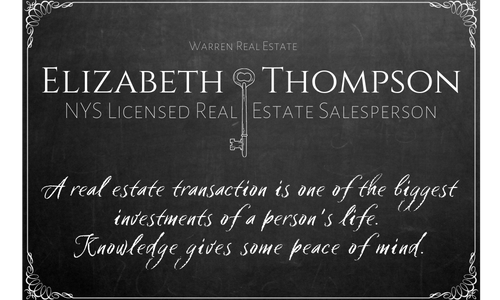Buyer Tips
The Real Estate Process - Get the Whole Picture.
Buying a home is an exciting time in your life. But it can also be complex and confusing. These buying tips provide knowledge that better prepares buyers and sellers to expect the unexpected. Before embarking on your next real estate contract, reviewing the process can help make real estate very easy.


Knowing the Statistics Can Help...
It's helpful to know where people are finding property and which resources are more effective than others. Elizabeth Thompson uses them all to ensure that her buyer clients are getting the top tier of service! Check out the video to see some of the statistics.
The Buying Process
Let's take this step-by-step. As your agent, I want you to be fully informed with as few surprises as possible.
The first step in buying a home is to realize that you need an agent. Most buyers start their search on their own and "window shop" for homes using online search sites or going to open houses. This is a great way to get a feel for the market and check your own commitment level. Keep in mind that having an agent at this point in time can fast-track your searching efforts, as they can help identify potential properties matching your criteria as they come on the market. They can also help clarify information and answer questions as you find properties that may interest you.
Choosing the right agent is one of the most important decisions you'll make as a buyer. An agent is going to advocate for you and protect your interests. In fact, their license requires it. They have a great amount of expertise and insight that can help you make the best decision possible.
Once you are ready to get focused on your search, I can help you identify lenders who might best meet your needs. In addition, I have a full list of area mortgage officers. Once you get pre-qualified, we'll be better equipped to find you the right home when it becomes available.
You think you've found the one! The offer will include your price and any other terms or conditions that your offer depends upon. You will also be required to put some earnest money forward to let the seller know you are serious. This goes into an escrow account held at our brokerage and is applied toward your purchase if your offer is accepted. You can lose your earnest money if you back out of the offer and it isn't based on any of your pre-ordained contract conditions. It is wise to include a property inspection as a condition to your offer. That way if major items come up, you can walk away and get your earnest money back, or negotiate a change in terms to the contract. Be sure to read over the sellers disclosure documents, as the seller is required by law to put any known material defects in the home in writing. You will also propose a closing date, which sets the target date for closing when you get the keys and the home is yours.
The seller may come back with their acceptance or a proposed change to your offer price or conditions. Don't worry, you can counter their offer as well. This can be a back-and-forth game until both parties come to an agreement. Once both parties have agreed on the terms in the offer, the property is under contract and the contract gets sent to your attorney for review. Typically the attorney has 3 business days to review and comment on the contract terms. The attorney can disapprove of the terms and cancel the contract, or propose additional changes, after consulting with you. The Seller’s attorney can do the same.
Once you’re under contract, it’s time to schedule your inspection of the home and conduct a radon test. Once these are completed and any changes negotiated with the seller, it’s time to make formal application for your mortgage.
When you apply, you will be providing any additional documents regarding your financial position (bank statements, tax returns, list of debts, etc) that your lender requires and paying the application and appraisal fees upfront. These are typically between $500 and $750. Then your lender can start the underwriting process.
Lenders want to ensure that the home is at least worth the amount they are lending you, so they will order an appraisal. This protects you from overpaying for the home. If you are putting up an all-cash offer, you are not required to have an appraisal.
Once your mortgage has been approved, the seller will complete their updating of the title and survey and your attorney will review these documents for any issues that might arise. Once the review is completed, the closing will be scheduled by your attorney in coordination with the seller’s attorney and bank attorney. On the day of closing, or perhaps the day before, we will walk through the property one more time to be sure everything looks to be in order.
At closing, you will provide your down payment and money for all other closing costs. After signing the mortgage, and related documents, you are now in the possession of the deed and you will get the keys to your new home.
Have more questions?
Give me a call or text me: (607) 330-5595

Buying Tips: Common Real Estate Terminology
Purchasing a home is a smart investment. However, if you’re purchasing a home for the first time, there is some terminology you need to be aware of regarding your future home mortgage. Here are some common words you’ll encounter when you’re looking for a home loan.
Knowing the terminology involved in your mortgage will help you stay on top of the mortgage process and allow the entire process to run smoothly. Familiarize yourself with these terms and keep yourself out of the dark.
Mortgage Terms
ADJUSTABLE RATE MORTGAGE (A.K.A. ARM LOAN)
A home loan where the interest rate adjusts throughout the term of the loan. ARM Loans usually have an initial interest rate that is lower than that of a Fixed-Rate Mortgage. This low-interest rate is locked for a set length of time. Once that time has expired, the interest rate can go up based on market factors. The lower initial interest rate helps those who can’t afford a fixed-rate mortgage get financing for their home. However, the interest rate will most likely increase when the initial term of the low-interest rate expires.
Mortgage Terms
FIXED RATE MORTGAGE
On a fixed rate mortgage loan the interest rate stays the same. It does not fluctuate while the loan is being paid off. Financing for fixed-rate mortgage loans are commonly spread out over 10, 15, 20, or 30 years. This type of loan is popular because there are typically no surprises. Since the interest rate remains the same, the monthly mortgage payments are static, and don’t change year to year.
Mortgage Terms
The interest rate of this ARM remains the same for 10 years and then, beginning with the 11th year, changes every year according to the index of the loan. The first number in the name designates the period of stable payments; the second number denotes how often the interest rate will change thereafter.
Mortgage Terms
Again, these ARMs have a stable payment for the period of the first listed number, then the interest rate changes according to the time period designated by the second listed number. For the 3/3 ARM the first 3 years would have stable payments. Then the interest rate would change every 3 years thereafter. The lengths of the time periods can be negotiated.
Mortgage Terms
30-DUE-IN-7 MORTGAGE
Also known as the two-step mortgage, or the 7/23 two-step. The interest rate and monthly payment remains stable for the first 7 years. At the beginning of the 8th year, the interest rate changes to reflect the current market rate, and remains fixed for the balance of the loan. This loan can help those who expect their income to increase in the future to qualify for a larger loan right now.
Mortgage Terms
BALLOON MORTGAGE
These types of mortgages can be interest-only, partially or fully amortized. However, after making payments for an agreed upon period of time (3, 5, or 7 years is typical) the entire balance of the loan becomes due and payable, thus the term balloon payment. This can be an effective mortgage for someone that knows that they will not live in the home for longer than the payment period. If they do, they must be prepared to meet the obligation of the final balloon payment or choose to refinance.
Mortgage Terms
FEDERAL HOUSING ADMINISTRATION (FHA) & VETERANS ADMINISTRATION (VA) LOAN
Offering a wide range of mortgage choices, these include 30 and 15 year fixed-rate mortgages, as well as ARMs. Insured by these government agencies, the loans feature low or no down payment terms and are often assumable by future purchasers. VA loans are restricted to individuals qualified by military service or other entitlements. FHA-loans are open to all qualified home purchasers. Note: that there are limits to handle moderate-priced homes anywhere in the country. Talk to your lender about FHA/VA possibilities.
Mortgage Terms
STATE OF NEW YORK MORTGAGE AGENCY (SONYMA)
Provides financing for low and moderate-income New Yorkers looking to buy their first home. It offers low down payments, below-market interest rates, longer rate lock periods, and various incentives to encourage borrowers to purchase and renovate properties in need of improvements.
Rates, Escrow, Percentage Rate Terms
PRINCIPAL
Principal is the original amount borrowed from the lender. It does not include interest or other fees. It’s the lump sum the borrower gets from the lender.
Rates, Escrow, Percentage Rate Terms
ESCROW/GOOD FAITH MONEY
Good faith money is a deposit of money into an escrow account by a buyer to show that they have the intention of completing a deal. Good faith money is often later applied to the purchase but may be refundable or non-refundable depending on the circumstances and conditions.
Rates, Escrow, Percentage Rate Terms
ANNUAL PERCENTAGE RATE (APR):
The measurement of the full cost of a loan including interest and loan fees expressed as a yearly percentage rate. Because all lenders apply the same rules in calculating the annual percentage rate, it provides consumers with a good basis for comparing the cost of different loans.
Insurance Terms
PRIVATE MORTGAGE INSURANCE (PMI)
Mortgage insurance provided by non-government insurers that protects a lender against loss if the borrower defaults.
Insurance Terms
TITLE INSURANCE
Insurance to protect a lender or owner against loss in the event of a property ownership dispute.
LISTING TERMS
APPRAISAL
An estimate of the value of property made by a qualified professional called an “appraiser.” Typically required by the bank.
LISTING TERMS
MULTIPLE LISTING SERVICE (MLS)
An MLS is a database that allows real estate agents to access and add information about properties for sale in an area.
LISTING TERMS
DAYS ON MARKET (DOM)
DOM is typically defined as the number of days from the date on which the property is listed for sale on the local real estate brokers’ multiple listing service (MLS) to the date when the seller has signed a contract but can also be the number of days from listing to the sale of the property or closing date.
Closing Terms
CLOSING COSTS
The expenses involved in finalizing a closing. Closing costs include lender/agency fees, loan origination costs, escrow payments, title insurance, attorney fees, etc. Closing costs are applicable to the buyer and the seller.
Closing Terms
CONTINGENCIES
This term refers to conditions that have to be met in order for the purchase of a home to be finalized. For example, there may be contingencies that the loan must be approved or that the home inspection is satisfactory.
Closing Terms
SELLER CONCESSIONS
Sellers may offer concessions to incentivize buyers to purchase the home, or sweeten the deal. Concessions are most readily seen as a contribution towards the buyer’s closing costs, up to certain limitations and approvals by a buyer’s lender, which ultimately leaves more money in a buyer’s pocket when all is said and done.








